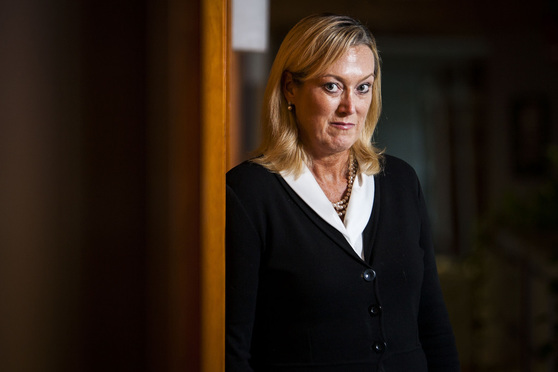Chadbourne Settles Sex Bias Case That Shined Light on Big Law Pay Gap
The deal resolves discrimination claims brought by Kerrie Campbell and two other partners against Chadbourne & Parke and its successor firm, Norton Rose Fulbright.
March 14, 2018 at 01:01 PM
7 minute read
The original version of this story was published on New York Law Journal
 Kerrie Campbell. Photo by Diego M. Radzinschi/ALM.
Kerrie Campbell. Photo by Diego M. Radzinschi/ALM.
Chadbourne & Parke and its successor firm, Norton Rose Fulbright, have agreed to settle a high-profile gender discrimination case brought by three former women partners, according to court papers filed Wednesday in Manhattan federal court.
To resolve the plaintiffs' claims under the Equal Pay Act, the defendants will pay $1 million to former Washington, D.C.-based Chadbourne partner Kerrie Campbell, $750,000 to New York-based Mary Yelenick and $250,000 to former Ukrainian partner Jaroslawa Johnson, as well as $1.08 million in attorney fees to plaintiffs firm Sanford Heisler Sharp.
The court papers do not disclose the entirety of the settlement. While the financial settlements—totaling more than $3 million—resolve the plaintiffs' EPA claims, there are “separate agreements that resolve all of plaintiffs' remaining claims against defendants,” said plaintiffs attorney David Sanford, founding partner of Sanford Heisler, in a filing.
Among the 24 counts alleged in their complaint, only four relate to the Equal Pay Act. The complaint also asserts the defendants violated city, state and federal discrimination and retaliation laws, and it asserts breach of contract, breach of fiduciary duty and unjust enrichment.
The suit against Chadbourne has been the most prominent in a series of recent cases related to the gap in pay between male and female partners at big law firms, including a case brought by a former partner at now-defunct Sedgwick and another case brought by the same plaintiffs firm against Proskauer Rose.
In a statement, plaintiffs attorney Alexandra Harwin, a partner at Sanford Heisler, said: “We're pleased that the parties have resolved the plaintiffs' claims under the Equal Pay Act and are hopeful the court will approve the settlements.”
She declined to comment about the terms of settlement for the other claims in the suit.
In a statement, a Norton Rose Fulbright spokesman said the motion is pending with the court and “we are hopeful that it will be granted.” He declined to comment further.
Campbell originally brought the suit in 2016 as a $100 million proposed class action complaint. Sanford Heisler said the suit was brought on behalf of lead plaintiff Campbell and about 26 current and former female Chadbourne partners.
The lawsuit alleged Chadbourne was run by an “all-male dictatorship” that pays women partners less and provides them fewer leadership opportunities than men. The suit alleged that female partners were paid less and receive smaller bonuses than their male counterparts and have been excluded from positions with decision-making authority.
The plaintiffs were suing Chadbourne and individual leading partners in the firm, including Abbe Lowell, Marc Alpert, Andrew Giaccia, Howard Seife, Lawrence Rosenberg and Paul Weber.
The Road to Settlement
The litigation became publicly acrimonious as Chadbourne filed counterclaims and the number of parties grew. Norton Rose Fulbright, which acquired Chadbourne in June 2017, was added as a defendant last October, while Johnson, a former Kiev office managing partner, petitioned to join the suit in 2016 and Yelenick, a former chairwoman of Chadbourne's products liability group in New York and now of counsel at Norton Rose, joined last year.
Chadbourne and Norton Rose Fulbright have faced several obstacles in the last several months, potentially increasing the plaintiffs' leverage.
The settlement comes about five months after U.S. District Judge J. Paul Oetken in Manhattan shot down Chadbourne's motions for summary judgment and to dismiss class and collective action claims, as well as denying competing claims by the plaintiffs.
Oetken in June ordered limited discovery to determine if the three former Chadbourne partners deserve protection as employees under employment laws, or if their former status as partial owners of the firm disqualifies them from bringing the suit.
As part of that discovery, Chadbourne has handed over some of the firm's most sensitive and confidential documents, including partner compensation information and the internal communications of the firm's management committee. Magistrate Judge Barbara Moses has ordered the individual defendants to search their personal email accounts for relevant documents.
Amid discovery last October, plaintiffs' attorneys hinted that a fourth plaintiff could enter the case, asserting that if the parties can't “reach prompt resolution,” the plaintiffs will seek to add her. In the end, a fourth plaintiff wasn't added. Court records show the parties did reach a settlement in principle for two plaintiffs just weeks after Sanford made the disclosure in court.
'Excellent Recovery'
In court documents, Sanford said the “settlements were only achieved after hard-fought and protracted negotiations” between counsel and a JAMS mediator, Dina Jansenson. Proskauer Rose partners Kathleen McKenna and Evandro Gigante represented Chadbourne, while Steven Bierman, partner of Sidley Austin, represented Norton Rose.
“The parties have made efforts to resolve this case over an extended period but were not successful until recently,” said Sanford in court papers, describing how the parties failed to reach agreement on several dates last year.
In November 2017, Johnson, Yelenick, and the defendants resumed mediation with Jansenson, where they finally reached an agreement, Sanford said. “Even after reaching this agreement in principle, it took over two months of intensive arm's length negotiations (including many teleconferences and email exchanges) for the settling parties to reach full agreement on all terms,” Sanford said, noting Johnson and Yelenick reached stand-alone settlement agreements on Jan. 22 to resolve their EPA claims.
It took a bit longer for Campbell, who entered into a settlement agreement with the defendants on Feb. 27 to resolve her EPA claims.
Sanford said his clients believe the EPA settlement agreements provide an “excellent recovery.”
For example, if Campbell is compared to a male partner whom she contends is similarly situated based on their revenue collections, her EPA back pay damages are about $1.39 million. If Campbell is compared to other male partners whom she contends handled similar types of cases, her EPA back pay damages are estimated at $316,649, Sanford said.
Chadbourne has disputed that Campbell and any of the higher-paid male partners at Chadbourne were similarly situated and that her stated criteria for comparison could yield a range of figures both higher and lower than what she asserts, Sanford said in a court filing.
Attorney fees represent about 35 percent of the gross settlement in each EPA agreement. “Plaintiffs, who are themselves lawyers with over thirty years of experience each, have fully approved these fees,” Sanford said.
The individual settlement agreements to resolve EPA claims, filed in court, do not address other causes of action in the suit, including discrimination claims, or the separate deals to resolve them. The agreements state that the plaintiffs agree that the payments represent a full and final settlement of disputes under the EPA.
The settlement papers, signed by representatives of the firms and the individual defendants, provide that the agreements are not an admission by Chadbourne and Norton Rose Fulbright that it committed any wrongdoing, or that the plaintiffs qualify as employees under federal labor protection laws.
This content has been archived. It is available through our partners, LexisNexis® and Bloomberg Law.
To view this content, please continue to their sites.
Not a Lexis Subscriber?
Subscribe Now
Not a Bloomberg Law Subscriber?
Subscribe Now
NOT FOR REPRINT
© 2025 ALM Global, LLC, All Rights Reserved. Request academic re-use from www.copyright.com. All other uses, submit a request to [email protected]. For more information visit Asset & Logo Licensing.
You Might Like
View All
Are Counsel Ranks Getting 'Squeezed' as Nonequity and Associate Pay Grows?
5 minute read


Trending Stories
Who Got The Work
J. Brugh Lower of Gibbons has entered an appearance for industrial equipment supplier Devco Corporation in a pending trademark infringement lawsuit. The suit, accusing the defendant of selling knock-off Graco products, was filed Dec. 18 in New Jersey District Court by Rivkin Radler on behalf of Graco Inc. and Graco Minnesota. The case, assigned to U.S. District Judge Zahid N. Quraishi, is 3:24-cv-11294, Graco Inc. et al v. Devco Corporation.
Who Got The Work
Rebecca Maller-Stein and Kent A. Yalowitz of Arnold & Porter Kaye Scholer have entered their appearances for Hanaco Venture Capital and its executives, Lior Prosor and David Frankel, in a pending securities lawsuit. The action, filed on Dec. 24 in New York Southern District Court by Zell, Aron & Co. on behalf of Goldeneye Advisors, accuses the defendants of negligently and fraudulently managing the plaintiff's $1 million investment. The case, assigned to U.S. District Judge Vernon S. Broderick, is 1:24-cv-09918, Goldeneye Advisors, LLC v. Hanaco Venture Capital, Ltd. et al.
Who Got The Work
Attorneys from A&O Shearman has stepped in as defense counsel for Toronto-Dominion Bank and other defendants in a pending securities class action. The suit, filed Dec. 11 in New York Southern District Court by Bleichmar Fonti & Auld, accuses the defendants of concealing the bank's 'pervasive' deficiencies in regards to its compliance with the Bank Secrecy Act and the quality of its anti-money laundering controls. The case, assigned to U.S. District Judge Arun Subramanian, is 1:24-cv-09445, Gonzalez v. The Toronto-Dominion Bank et al.
Who Got The Work
Crown Castle International, a Pennsylvania company providing shared communications infrastructure, has turned to Luke D. Wolf of Gordon Rees Scully Mansukhani to fend off a pending breach-of-contract lawsuit. The court action, filed Nov. 25 in Michigan Eastern District Court by Hooper Hathaway PC on behalf of The Town Residences LLC, accuses Crown Castle of failing to transfer approximately $30,000 in utility payments from T-Mobile in breach of a roof-top lease and assignment agreement. The case, assigned to U.S. District Judge Susan K. Declercq, is 2:24-cv-13131, The Town Residences LLC v. T-Mobile US, Inc. et al.
Who Got The Work
Wilfred P. Coronato and Daniel M. Schwartz of McCarter & English have stepped in as defense counsel to Electrolux Home Products Inc. in a pending product liability lawsuit. The court action, filed Nov. 26 in New York Eastern District Court by Poulos Lopiccolo PC and Nagel Rice LLP on behalf of David Stern, alleges that the defendant's refrigerators’ drawers and shelving repeatedly break and fall apart within months after purchase. The case, assigned to U.S. District Judge Joan M. Azrack, is 2:24-cv-08204, Stern v. Electrolux Home Products, Inc.
Featured Firms
Law Offices of Gary Martin Hays & Associates, P.C.
(470) 294-1674
Law Offices of Mark E. Salomone
(857) 444-6468
Smith & Hassler
(713) 739-1250









